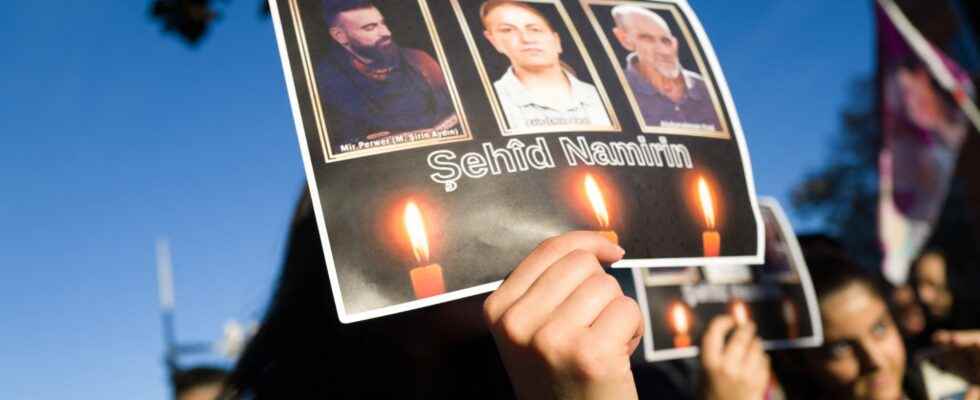Thibaud Hue, with AFP
modified to
7:21 p.m., December 26, 2022
“Stop asking us to believe this version”: the Kurdish community refuses to accept that the attack which killed three of its members in Paris is a racist crime of an isolated man, indicted and placed in pre-trial detention this Monday, and continues to see the hand of Turkey there. “Erdogan’s fascist regime has struck again,” hammered Agit Polat, the young president of the Kurdish Democratic Council in France (CDK-F) into a megaphone on Monday during a march organized in Paris in memory of the victims.
A few hundred participants
In everyone’s mind, and on the row of portraits brandished in the front row, the memory of the triple murder, never elucidated, of three militants of the Kurdistan Workers’ Party (PKK) on January 9, 2013 in Paris, surfaces. The route of the march, which brought together a few hundred participants, symbolically linked the Kurdish cultural center targeted on Friday to the building on rue Lafayette, not far from there, where the three activists were shot ten years ago.
Quickly arrested, their killer died of cancer in 2016 a few weeks before his trial. But even if the civil parties obtained in 2019 the relaunch of the investigation to examine the possible involvement of the Turkish intelligence services, the Kurds of France have since doubted the impartiality of French justice.
“For us, it’s obvious, he (the suspect, editor’s note) could not act alone, there is a link with Turkey”, affirms a participant in the march, Denis “unfortunately” Erdogan, who regrets to share the same surname as that of Turkish President Recep Tayyip Erdogan.
The suspect feels a “pathological hatred of foreigners”
The suspect, a 69-year-old former train driver, confided in police custody a “pathological hatred of foreigners” since a burglary of which he was the victim in 2016 and explained “having attacked victims that he did not didn’t know”. He also declared, according to the Paris prosecutor Laure Beccuau, to be angry “with all the migrants” and “with the Kurds for having ‘constituted prisoners during their fight against Daesh (the Islamic State organization, editor’s note) instead of kill'”.
Agit Polat, who believes that the alleged shooter may have been manipulated during his time in prison, says he is “incredulous” in the face of the first elements of the investigation revealed by the prosecutor. “In 24 hours, we talk about the psychiatric case and then in fact not”, he explains in reference to the lifting for health reasons of the police custody of the suspect, admitted for a few hours to the psychiatric unit of the prefecture of Paris police. “We are trying at all costs to avoid referral to the anti-terrorist prosecutor’s office,” insists Agit Polat.
The “misunderstanding” of the Kurdish community
The National Anti-Terrorist Prosecutor’s Office (Pnat) has not, at this stage, taken up the investigation into Friday’s attack. The lawyer for the families of the three activists killed in 2013, Me Antoine Comte, also underlined the “misunderstanding” of the Kurdish community, believing that the terrorist qualification had been “retained for similar facts in 2013”. “It appears to be a deeply political decision. Obviously, the prosecution does not want to take the risk of incriminating the Turkish state, even subliminally,” he told AFP, “it’s a geopolitical problem. “.
Since Friday, no member of this community of Kurdish refugees from Turkey, Iraq or Iran wants to believe that Friday’s victims died of a banal xenophobic act, which would have nothing to do with the movement of Kurdish liberation and its conflict with the Turkish regime.
French Ambassador to Turkey summoned
The Kurdish community sees itself as “secular, hardworking and integrated”, in the words of a young restaurant employee who requested anonymity, and is not among the usual targets of the French ultra-right. The Kurdish journalist and activist Selma Akkaya evokes a phenomenon “of superimposition of the images of 2013”.
Unsurprisingly, the Turkish government did not take kindly to the accusations from the Kurdish community in France. Three days after the attack, he summoned the French ambassador to Turkey to express his “displeasure” at what he considers to be “anti-Turkey propaganda” launched “by PKK circles”.
